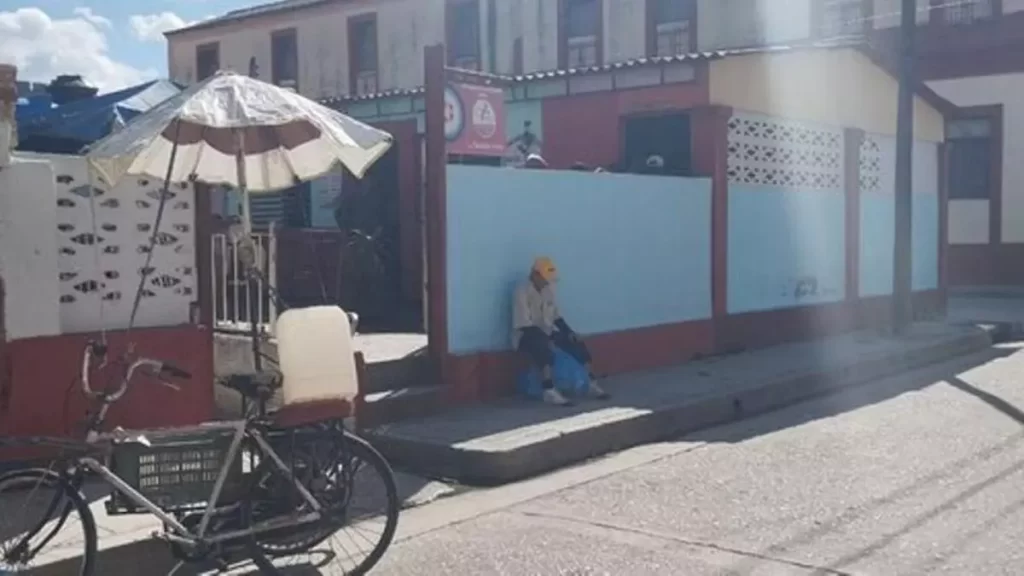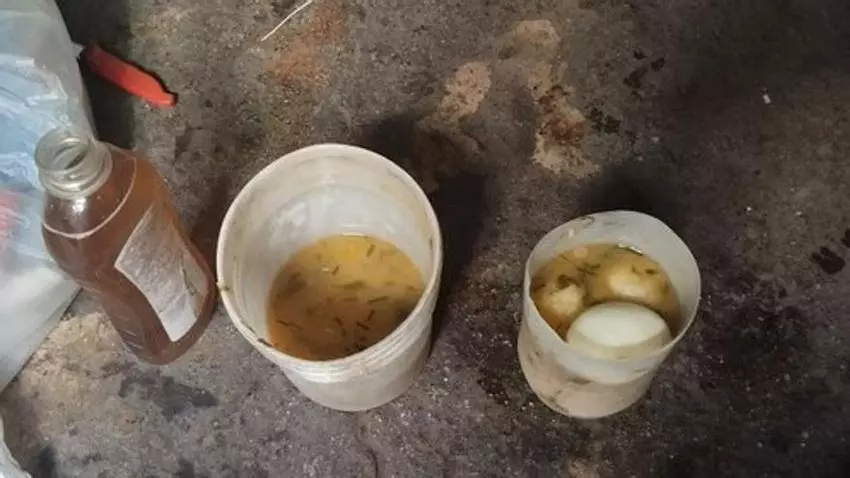
![]() 14ymedio, Miguel García, Holguín, 25 February 2024– This Friday, Tomás, 81 years old, felt lucky. “Today they did offer a strong course, a boiled egg, and there was pea soup that I brought home. With this cold weather, the body is asking for something like that,” he lists the food he bought at the dining room of the Family Care System (SAF) from the Pueblo Nuevo neighborhood in the city of Holguín. A subsidized trade network especially hit by the economic crisis that Cuba is going through.
14ymedio, Miguel García, Holguín, 25 February 2024– This Friday, Tomás, 81 years old, felt lucky. “Today they did offer a strong course, a boiled egg, and there was pea soup that I brought home. With this cold weather, the body is asking for something like that,” he lists the food he bought at the dining room of the Family Care System (SAF) from the Pueblo Nuevo neighborhood in the city of Holguín. A subsidized trade network especially hit by the economic crisis that Cuba is going through.
“Normally, at the end of the month, there is always a shortage of protein and it is a miracle that there are still eggs”, explains Tomás to 14ymedio. For the price of 2.60 pesos per egg, the old man bought a boiled egg and also added a portion of white rice for 2.65 pesos, a portion of boiled cassava for 14.00 and a thin pea soup for 1.65. To accompany the menu, he added a soft drink, made with syrup, for 5.00 pesos.
“I don’t like to eat there, I prefer to bring food home and decide at what time to eat what,” he explains. In his humble kitchen, Tomás places the pots with the food he has bought at the SAF and decides what will be served for lunch and what he will save for dinner. He knows that he won’t have anything else to put in his mouth during the day, so he tries to organize himself.

“Sometimes there is no protein, although in my dining room the workers are quite combative and they fight with the people of the municipality to send them supplies, but one can see that it is becoming more and more difficult for them to achieve this each time”. This month, Tomás has eaten an egg and a sausage similar to blood sausage as a main course. Fruits or vegetables haven’t arrived “for years”, he says.
“The workers make an effort, they buy the spices, many times out of their own pockets, so that it has some flavor”, adds Tomás, who has been eating at the SAF since 1996, when they began to operate. A physical disability, added to aging, has made him dependent for almost three decades on a mechanism that he prides himself on being the “founder” of, and being familiar with every detail of it: its best moments and its current deterioration.
In the entire province of Holguín there are more than 6,400 people who, like Tomás, receive a food ration through the SAF canteens, according to data published by the official press at the end of 2021, but the number may have grown significantly to the same extent that inflation and shortages increase. In Holguín’s capital, the number currently exceeds 3,500 registered people, distributed through 13 dining rooms.
“A few years ago, they gave us breakfast, lunch and dinner”, recalls the retiree, who has a pension of 1,543 pesos per month (a little more than five dollars at the informal exchange rate) and spends an average of between 20 and 25 pesos a day at the SAF. “They even used to sell snacks in that place, but all that changed when Raúl Castro took power in 2008. They began to slash what was deemed as ‘unnecessary expenses’ and we lost snacks and breakfast, leaving us with only one meal a day”.
Inés, 79 years old, does not remember those first moments of abundance in the SAF, because she only became a user of those canteens about four years ago, with the arrival of the pandemic. “My husband died and my pension is not enough for my meals. Just to get the rice, the oil and the seasonings, all the money would disappear and I would have nothing left for protein”, she says.
A social worker from Holguín noticed Inés’s vulnerability after several reports from neighbors. “They came and filled out a form that is in my file. The form reached the Municipal Administration Council, where they approved me, but it took time. It took almost three months. They enrolled me in the Villanueva dining room, which is where I still am now”.

The 76,175 people registered in the SAF who attend 445 soup kitchens of this type in Cuba have had to go through this process, with greater or lesser speed. A service that is frequently criticized for the poor quality of its food preparation, which often lacks spices, oil or fats. The deterioration of the dishes is not only due to official shortages, but also to the looting of products carried out by the employees themselves, as this newspaper has echoed in previous reports.
“Everyone has to live, so, amid deliveries of ever-diminishing supplies and the need for employees to have some income, what reaches the plates is less and less,” Inés acknowledges. “I eat it because I don’t have anything else, but the food is not good, I don’t want to eat it, sometimes I even hold my breath while I chew it to avoid tasting it”.
“One requisite to be accepted in the SAF is not having cooking utensils: stove, pots, pans or anything like that. No gas stove or electric stove, you have to show that you cannot prepare the food you are going to consume”, explains the old woman. “You have to prove that you are a critical case, that you cannot work, nor do you have a family to take care of you.”
“Since I started eating there, I have lost almost 30 pounds, because what they sell is very little for each person and, of course, you can only buy one serving. It’s not that I can say ‘give me two eggs’ and I take them home, I get one and that’s what it is”, she points out. “The prices are still cheap, and the fear that other old people and I have is that they are about to raise everything”.
This week, fear has spread among people like Inés and Tomás, because the deepening of the economic crisis and the lack of foreign currency to purchase food abroad are pushing the SAF to the limit. “There was a meeting with an official from the provincial Gastronomy Company to talk about the future of the SAF,” says the woman.
“Since I started eating there, I have lost almost 30 pounds, because what they sell is very little for each person”
The manager warned the canteen employees that the import situation is critical, and the producers’ commitment to deliver food to serve vulnerable people is not being fulfilled. “We are studying other ways through the Committees for the Defense of the Revolution (CDR) to collect food for the elderly in the area”, she said.
The allusion to involve the CDR’s in the collection of food, grains and other products to guarantee food in the SAF has generated deep concern. “At the moment they are working poorly, but at least they are there, I can’t imagine waking up without being guaranteed at least some watery peas and a little rice”, Inés fears.
“What they sell us now is not even enough for a cat, imagine for a person, but it’s something”, she concludes.
Translated by Norma Whiting
____________
COLLABORATE WITH OUR WORK: The 14ymedio team is committed to practicing serious journalism that reflects Cuba’s reality in all its depth. Thank you for joining us on this long journey. We invite you to continue supporting us by becoming a member of 14ymedio now. Together we can continue transforming journalism in Cuba.
